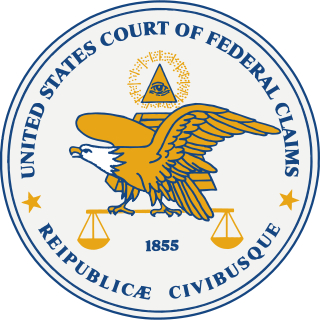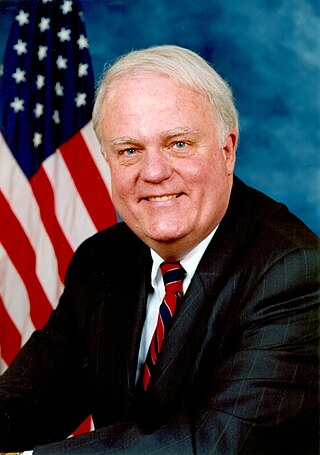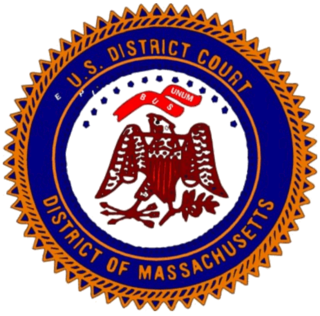
The United States district courts are the trial courts of the U.S. federal judiciary. There is one district court for each federal judicial district. Each district covers one U.S. state or a portion of a state. There is at least one federal courthouse in each district, and many districts have more than one. District court decisions are appealed to the U.S. court of appeals for the circuit in which they reside, except for certain specialized cases that are appealed to the U.S. Court of Appeals for the Federal Circuit or directly to the U.S. Supreme Court.
A work of the United States government is defined by the United States copyright law, as "a work prepared by an officer or employee of the United States Government as part of that person's official duties". Under section 105 of the Copyright Act of 1976, such works are not entitled to domestic copyright protection under U.S. law and are therefore in the public domain.

The United States Court of Federal Claims is a United States federal court that hears monetary claims against the U.S. government. It was established by statute in 1982 as the United States Claims Court, and took its current name in 1992. The court is the successor to trial division of the United States Court of Claims, which was established in 1855.

The Uruguay Round Agreements Act is an Act of Congress in the United States that implemented in U.S. law the Marrakesh Agreement of 1994. The Marrakesh Agreement was part of the Uruguay Round of negotiations which transformed the General Agreement on Tariffs and Trade (GATT) into the World Trade Organization (WTO). One of its effects is to give United States copyright protection to foreign works that had previously been in the public domain in the United States.
The copyright symbol, or copyright sign, ©, is the symbol used in copyright notices for works other than sound recordings. The use of the symbol is described by the Universal Copyright Convention. The symbol is widely recognized but, under the Berne Convention, is no longer required in most nations to assert a new copyright.
The Design Piracy Prohibition Act, H.R. 2033, S. 1957, and H.R. 2196, were bills of the same name introduced in the United States Congress that would have amended Title 17 of the United States Code to provide sui generis protection to fashion designs for a period of three years. The Acts would have extended protection to "the appearance as a whole of an article of apparel, including its ornamentation," with "apparel" defined to include "men's, women's, or children's clothing, including undergarments, outerwear, gloves, footwear, and headgear;" "handbags, purses, and tote bags;" belts, and eyeglass frames. In order to receive the three-year term of protection, the designer would be required to register with the U.S. Copyright Office within three months of going public with the design.
In the United States, internet censorship is the suppression of information published or viewed on the Internet in the United States. The First Amendment of the United States Constitution protects freedom of speech and expression against federal, state, and local government censorship.
The Prioritizing Resources and Organization for Intellectual Property Act of 2008 is a United States law that increases both civil and criminal penalties for trademark, patent and copyright infringement. The law also establishes a new executive branch office, the Office of the United States Intellectual Property Enforcement Representative (USIPER).

The Sonny Bono Copyright Term Extension Act – also known as the Copyright Term Extension Act, Sonny Bono Act, or (derisively) the Mickey Mouse Protection Act – extended copyright terms in the United States in 1998. It is one of several acts extending the terms of copyright.

Frank James Sensenbrenner Jr. is an American politician who represented Wisconsin's 5th congressional district in the United States House of Representatives from 1979 to 2021. He is a member of the Republican Party.

The Copyright Act of 1976 is a United States copyright law and remains the primary basis of copyright law in the United States, as amended by several later enacted copyright provisions. The Act spells out the basic rights of copyright holders, codified the doctrine of "fair use", and for most new copyrights adopted a unitary term based on the date of the author's death rather than the prior scheme of fixed initial and renewal terms. It became Public Law number 94-553 on October 19, 1976 and went into effect on January 1, 1978.
The copyright law of the United States grants monopoly protection for "original works of authorship". With the stated purpose to promote art and culture, copyright law assigns a set of exclusive rights to authors: to make and sell copies of their works, to create derivative works, and to perform or display their works publicly. These exclusive rights are subject to a time and generally expire 70 years after the author's death or 95 years after publication. In the United States, works published before January 1, 1929, are in the public domain.

The Digital Millennium Copyright Act (DMCA) is a 1998 United States copyright law that implements two 1996 treaties of the World Intellectual Property Organization (WIPO). It criminalizes production and dissemination of technology, devices, or services intended to circumvent measures that control access to copyrighted works. It also criminalizes the act of circumventing an access control, whether or not there is actual infringement of copyright itself. In addition, the DMCA heightens the penalties for copyright infringement on the Internet. Passed on October 12, 1998, by a unanimous vote in the United States Senate and signed into law by President Bill Clinton on October 28, 1998, the DMCA amended Title 17 of the United States Code to extend the reach of copyright, while limiting the liability of the providers of online services for copyright infringement by their users.
The Fair Copyright in Research Works Act was submitted as a direct response to the National Institutes of Health (NIH) Public Access Policy; intending to reverse it.

The Leahy–Smith America Invents Act (AIA) is a United States federal statute that was passed by Congress and signed into law by President Barack Obama on September 16, 2011. The law represents the most significant legislative change to the U.S. patent system since the Patent Act of 1952 and closely resembles previously proposed legislation in the Senate in its previous session.

The Stop Online Piracy Act (SOPA) was a proposed United States congressional bill to expand the ability of U.S. law enforcement to combat online copyright infringement and online trafficking in counterfeit goods. Introduced on October 26, 2011, by Representative Lamar Smith (R-TX), provisions included the requesting of court orders to bar advertising networks and payment facilities from conducting business with infringing websites, and search engines from linking to the websites, and court orders requiring Internet service providers to block access to the websites. The proposed law would have expanded existing criminal laws to include unauthorized streaming of copyrighted content, imposing a maximum penalty of five years in prison.

United States v. LaMacchia 871 F.Supp. 535 was a case decided by the United States District Court for the District of Massachusetts which ruled that, under the copyright and cybercrime laws effective at the time, committing copyright infringement for non-commercial motives could not be prosecuted under criminal copyright law.

The Innovation Act of the 113th Congress is a bill that would change the rules and regulations surrounding patent infringement lawsuits in an attempt to reduce patent lawsuits.

The Copyright Remedy Clarification Act (CRCA) is a United States copyright law that attempted to abrogate sovereign immunity of states for copyright infringement. The CRCA amended 17 USC 511(a):
In general. Any State, any instrumentality of a State, and any officer or employee of a State or instrumentality of a State acting in his or her official capacity, shall not be immune, under the Eleventh Amendment of the Constitution of the United States or under any other doctrine of sovereign immunity, from suit in Federal Court by any person, including any governmental or nongovernmental entity, for a violation of any of the exclusive rights of a copyright owner provided by sections 106 through 122, for importing copies of phonorecords in violation of section 602, or for any other violation under this title.

The Innovation Act of the 114th Congress is a bill that would change the rules and regulations surrounding patent infringement lawsuits in an attempt to reduce enforceability of patents.





